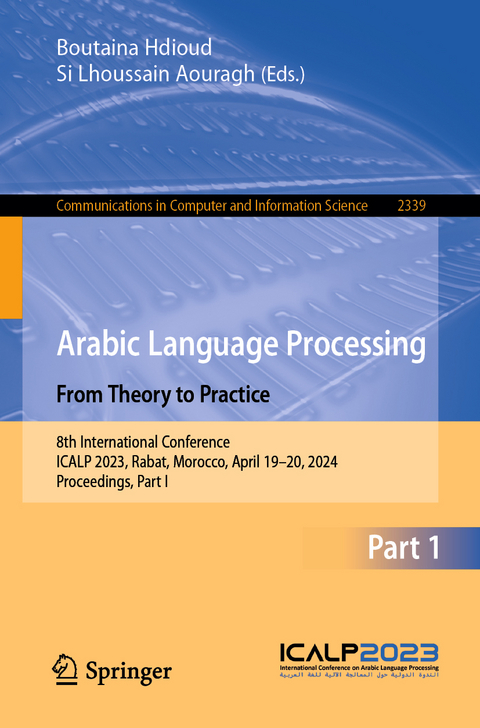
Arabic Language Processing: From Theory to Practice
Springer International Publishing (Verlag)
978-3-031-79163-5 (ISBN)
- Noch nicht erschienen - erscheint am 25.03.2025
- Versandkostenfrei innerhalb Deutschlands
- Auch auf Rechnung
- Verfügbarkeit in der Filiale vor Ort prüfen
- Artikel merken
This two-volume set, CCIS 2339 and CCIS 2340, constitutes the refereed proceedings of the 8th International Conference on Arabic Language Processing, ICALP 2023, held in Rabat, Morocco, during April 19-20, 2024.
The 30 full papers and 11 short papers presented in these two volumes were carefully reviewed and selected from 107 submissions.
The papers are organized in the following topical sections:
Part I: Learning Arabic and dialectal and Sentiment Analysis; Advancements in Deep Learning for Arabic Language Processing: Generation, Translation, and QA.
Part II: Linguistic Resources for Arabic NLP; Various analysis of Arabic.
.- Learning Arabic and dialectal and Sentiment Analysis.
.- Sentiment Analysis on Moroccan Dialect of Arabic combining NLP and ML methods.
.- Enhancing Arabic Sentiment Analysis using Arabic LLMs.
.- Sentiment analysis of texts written in Arabic: Addressing the issue of negation.
.- Automatic Arabic Essays Scoring: A Scoping Review.
.- Bridging the Emotional Gap: Google NL-AI Sentiment Analysis in Comparing Moroccan Literary Translations.
.- HateTune: Tunisian Dialect Hate Speech Detection Dataset.
.- DarijaGenie: Learning Moroccan Arabic Through a Multimodal Chatbot.
.- Morpho-lexical based approach for Arabic WorldNet extension.
.- A Hybrid Annotation Model for Arabic Argumentative Debate Corpus.
.- Alkhalil Platform for Arabic Language Processing.
.- Advancements in Deep Learning for Arabic Language Processing : Generation, Translation, and QA.
.- Exploring semantic Hadith Overlap across Topics.
.- Stance Detection in Arabic Dialects: Preliminary Experiments.
.- MAGENTA: Generating and Detecting Arabic Machine-Generated Text in Multiple Domains.
.- Transformers and Spark for Automated CV Classification in Arabophone regions.
.- Fine-Tuning AraBART on AHS dataset for Arabic Abstractive Summarization.
.- Qur'an Passage Ranking Using Transformer Models.
.- Question Answering Over the Arabic Hadith Sharif Using Transformer Models.
.- Deep Reinforcement Learning for Arabic Machine Translation: A Study on Reward Signals.
.- ARAP-IRONY: a Multi-dialectal Arabic Irony Corpus for Irony Detection.
.- Context-aware Arabic Diacritization using Transformers.
.- Classifying Persuasion Modes in Arabic Debates: A Preliminary Language Model-based Analysis.
.- Strengthening deep learning through morphological analysis for an Arabic Lemmatizer development.
.- Enhancing Arabic Word Sense Disambiguation with Ensemble BERT-based Models.
| Erscheint lt. Verlag | 25.3.2025 |
|---|---|
| Reihe/Serie | Communications in Computer and Information Science |
| Zusatzinfo | XII, 279 p. 64 illus. |
| Verlagsort | Cham |
| Sprache | englisch |
| Maße | 155 x 235 mm |
| Themenwelt | Informatik ► Theorie / Studium ► Künstliche Intelligenz / Robotik |
| Schlagworte | Arabic Dialect Processing • Arabic Language Processing • Arabic Script Handling • Arabic Text Classification • Corpus Linguistics • Diacritics Restoration • Language Modeling • Machine Translation • morphological analysis • Named Entity Recognition (NER) • Natural Language Processing (NLP) • Part-of-speech Tagging • Phonological analysis • Root Extraction • sentiment analysis • Speech Recognition • stemming • Syntax Parsing • Tokenization • Word Embeddings |
| ISBN-10 | 3-031-79163-0 / 3031791630 |
| ISBN-13 | 978-3-031-79163-5 / 9783031791635 |
| Zustand | Neuware |
| Informationen gemäß Produktsicherheitsverordnung (GPSR) | |
| Haben Sie eine Frage zum Produkt? |
aus dem Bereich


